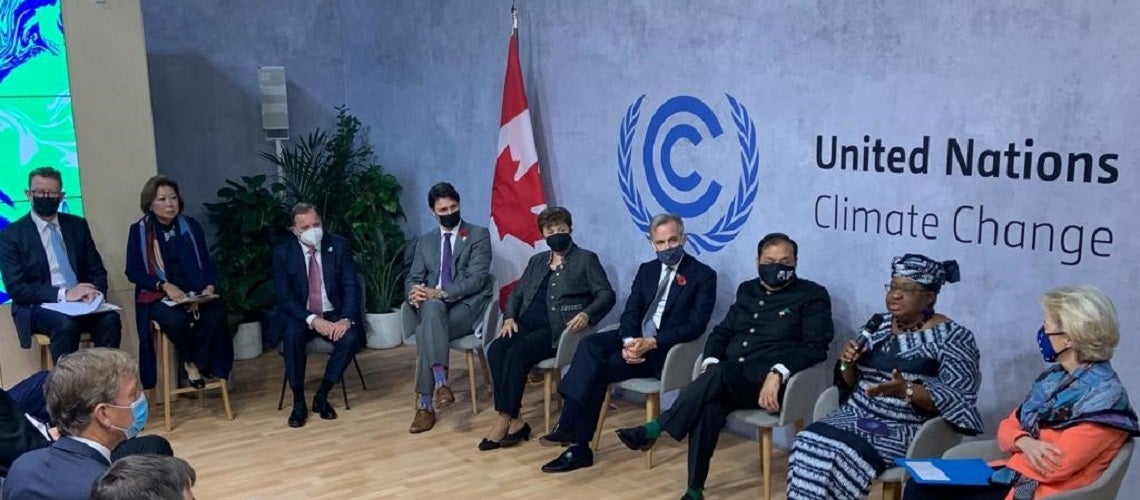 Carbon Pricing Leadership Coalition’s High-level event hosted by Right Honourable Justin Trudeau, Prime Minister of Canada and the Right Honourable Lord Barker of Battle, High-Level Co-Chair of the Carbon Pricing Leadership Coalition at COP26.
Carbon Pricing Leadership Coalition’s High-level event hosted by Right Honourable Justin Trudeau, Prime Minister of Canada and the Right Honourable Lord Barker of Battle, High-Level Co-Chair of the Carbon Pricing Leadership Coalition at COP26.
Six years ago, leaders from the World Bank, International Monetary Fund, governments, businesses, and nongovernmental organizations came together on the sidelines of COP21 in Paris to launch the Carbon Pricing Leadership Coalition (CPLC) and firmly place carbon pricing on the global agenda. Today, we are at a watershed moment for carbon pricing. Once relegated to the corridors of policy, carbon pricing is now a vital tool in the arsenal of measures that must be utilized to achieve the Paris Agreement and reach net-zero by 2050. Some 65 carbon pricing initiatives have been implemented globally. And, after half a decade of negotiations, Article 6 of the Paris Agreement rulebook on international cooperation through carbon markets was agreed to by governments at the UN climate talks at COP26 in Glasgow – potentially accelerating the adoption of a carbon price.
"Once relegated to the corridors of policy, carbon pricing is now a vital tool in the arsenal of measures that must be utilized to achieve the Paris Agreement and reach net-zero by 2050."
The CPLC has been central to building support for carbon pricing. A trusted and respected platform, the Coalition has strengthened the case for a price on carbon by collecting the evidence base, deepening understanding of the business and economic case for it, and by facilitating government and business leadership dialogues on pressing carbon pricing issues. The High-Level Commission on Carbon Prices, convened by the CPLC and co-chaired by Nobel Laureate Joseph Stiglitz and Lord Nicholas Stern, brought together leading economists from developed and developing countries to identify the range of carbon prices that would help reach the Paris Agreement goals. The report found that a carbon price of $50-$100 per ton by 2030, when combined with supportive policies, would allow for the achievement of the goals set out in the Paris Agreement. The High-Level Commission's findings on the social cost of carbon are widely accepted as the benchmark and have been referenced in over 54,000 media articles discussing a carbon price.
Since its launch, the Coalition's work has made CPLC a one-stop shop to support carbon pricing action – helping build government capacity, link markets, and scale up climate finance. The Faster Principles, published in CPLC's inaugural year, provided a much-needed guide on principles for effective carbon pricing. Building on this, the CPLC, in collaboration with the Partnership for Market Readiness, released the Guide to Communicating Carbon Pricing to support partners’ outreach to stakeholders.
By elevating the economic case for carbon pricing, the CPLC supports companies, investors, and governments in understanding scenarios under various carbon pricing policies and timelines. CPLC's High-Level Commission on Carbon Pricing and Competitiveness Report explored competitiveness concerns from industry and government peers in the corporate and public sectors. It provided an objective basis to embolden ambitious action to price carbon. The latest Net Zero Goals and Carbon Pricing Report from CPLC laid out how to harness the potential of carbon pricing in implementing strategies to get to net-zero emissions by mid-century.
"By elevating the economic case for carbon pricing, the CPLC supports companies, investors, and governments in understanding scenarios under various carbon pricing policies and timelines."
CPLC has advanced and mainstreamed the carbon pricing agenda for six years. However, we are now at a unique moment where there is a need for the continuous evolution of the Coalition's work to inspire confidence in carbon pricing as an effective tool to combat climate change. At a CPLC-convened High-Level event at COP26, Canadian Prime Minister Justin Trudeau issued a call to action to get 60% of emissions covered by a price on carbon by 2030. Through its technical expertise and convening power, the Carbon Pricing Leadership Coalition is strategically placed to provide a platform to amplify a response to this call to action, inspire others to follow suit, and help increase the adoption of carbon pricing.



Join the Conversation